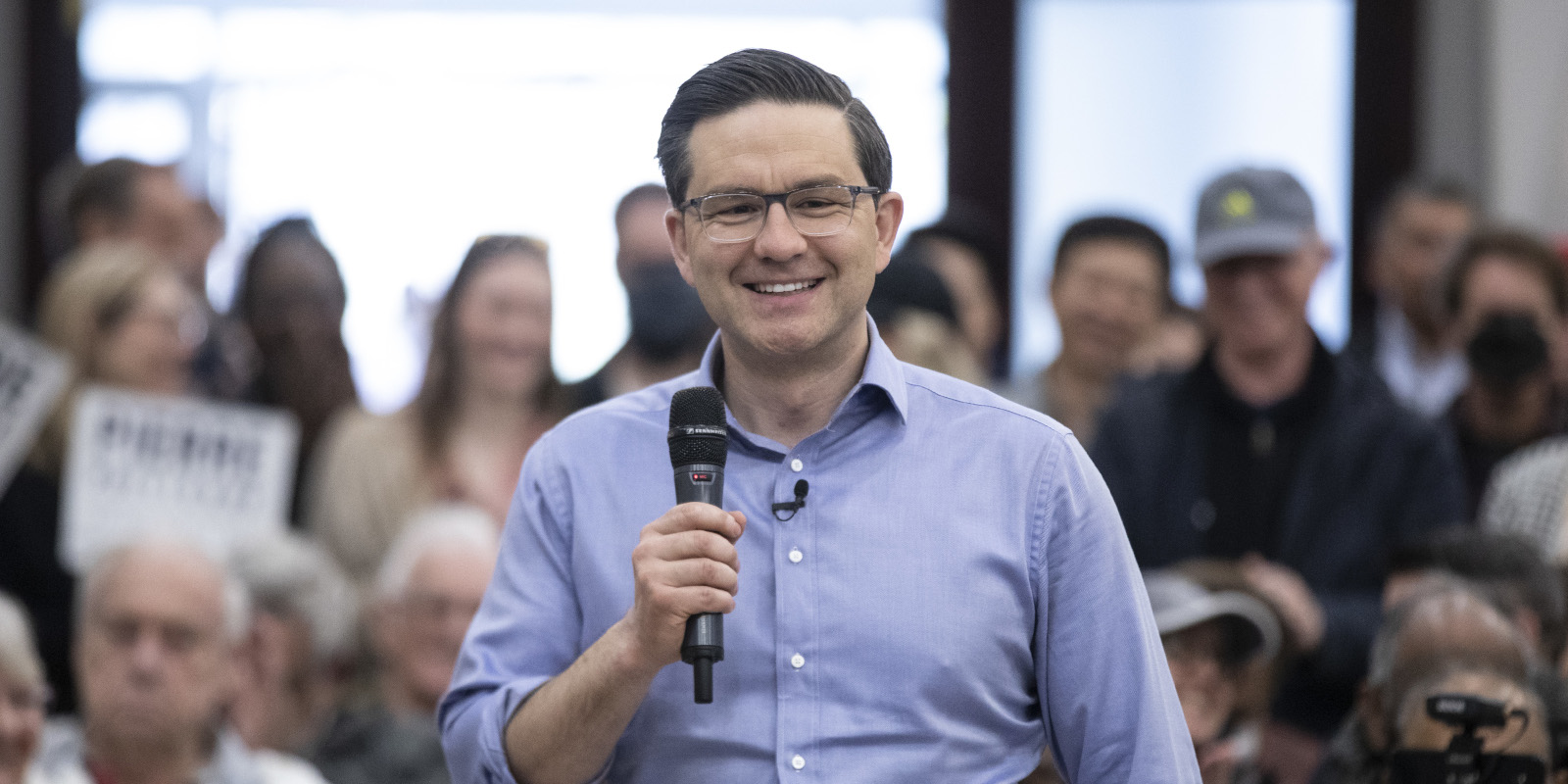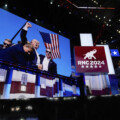It was a big week for United Conservative Party leadership candidate Danielle Smith, for reasons both good and potentially bad.
A Leger poll released last Sunday had Smith leading all other contenders, with 22 percent of UCP supporters tentatively backing her. In second was Brian Jean, MLA for Fort McMurray-Lac La Biche, with 20 percent. Travis Toews, a former cabinet minister in Premier Jason Kenney’s government, came in third with 15 percent.
Smith, a former columnist and radio host, has emphasized strengthening Alberta’s provincial sovereignty, specifically its ability to develop and export its natural resources without federal interference, in her campaign’s flagship promises.
Her proposed “Alberta Sovereignty Act” would empower Alberta’s government to refuse to enforce any federal law or policy that threatens Alberta’s interests or provincial rights. Smith has promised to introduce the bill on her first day as premier if she wins the race.
Commentators have called Smith’s plans unconstitutional and unworkable, but others acknowledge she has turned Albertan sovereignty and autonomy into key issues in the leadership race.
Whatever boost Smith’s campaign received from the Leger poll was dampened, if only slightly, by her comments on a podcast last week where she appeared to suggest cancer patients could control the sickness, as long as it was before stage 4.
Smith’s comments were criticized and condemned from all sides, making Smith’s already-contentious campaign even more controversial. It helped set the stage for Wednesday’s first official UCP leadership debate in Medicine Hat.
Lasting roughly two hours, and beset by technical difficulties, several of the eight candidates on the debate stage took thinly-veiled shots at Smith during their opening statements.
“Being premier is a lot more than being a talk-show host. We need stable and serious government in Alberta now, more than ever,” said Rajan Sawhney, MLA for Calgary-North East, and former provincial cabinet minister.
Next up was Rebecca Schulz, MLA for Calgary-Shaw, who said Alberta needed, “…someone who is disciplined, who won’t let you down with embarrassing comments…”
Opting to not attack Smith in his opening statement, Jean emphasized his desire to increase the autonomy of Alberta and the people who live within it.
“I believe that the United Conservative Party has the best ideas and the best principles,” said Jean. “If the UCP is led in a way that connects with everyday Albertans, we will have success.”
In Sunday’s Leger poll, 42 percent of surveyed Albertans indicated the next UCP leader needed a clear plan to stabilize Alberta’s economic growth. Twenty-one percent of respondents prioritized rebuilding health care and education, while 18 percent valued “conservative “ values and freedom as their top concerns.
Despite the data, the UCP debate often resembled less of a conversation about those issues and more a collective interrogation of Smith, interspersed with some wonkish policy debates.
Affordability was the first major topic brought forward by debate moderator Jeff Davison, leading to a spirited back-and-forth between Toews and Todd Loewen, MLA for Central Peace-Notley.
The two argued about the Kenney government’s fiscal record and whether Toews ever entertained the idea of introducing a provincial sales tax in Alberta. Sawhney, Smith, Schulz, and Leela Aheer, MLA for Chestermere-Strathmore, briefly spoke about re-indexing tax benefits, combating inflation, and tax relief, among other fiscal matters, before the debate topic switched to the environment.
When called upon to discuss the issue, Smith initially spoke about getting Alberta to net-zero carbon emissions. However, Sawhney followed up by criticizing the Alberta Sovereignty Act, prompting Smith to begin discussing economic corridors to out-of-province ports without federal involvement.
Sawhney responded by saying economic corridors were already in the works, forcing Davison to try and steer the debate back to the environment, to little avail.
“Ottawa has created chaos, Ottawa has cancelled our projects, Ottawa has caused Energy East and Teck Frontier Mine, and tens of billions of other projects to be cancelled,” said Smith. “Part of our strategy to reduce greenhouse gas emissions is exporting our clean LNG to displace coal in India and China. We cannot do that because Ottawa keeps standing in our way…”
Both Sawhney and Toews asserted Smith’s proposed Sovereignty Act was an unrealistic solution to Alberta’s problems.
“There are no shortcuts, there is no magical Sovereignty Act or any other legislation that is going to let us bypass those steps,” said Sawhney. “The problem is when we shoot ourselves in the foot with provincial policies like the Sovereignty Act.”
While the topic soon moved on to health care, Sawhney kept challenging Smith, demanding to know when she would apologize for her comments about cancer being controllable.
Soon after, Smith demanded to know when the present former cabinet ministers would apologize for imposing COVID lockdown restrictions, resulting in raucous cheers from the gathered audience.
When given time to speak, Toews and Jean both emphasized the need to improve health care, especially in rural Alberta. Jean, who lost a son to cancer in 2015, ended his pitch by expressing his disappointment in Smith for her comments and took the opportunity to stare her down.
When the subject shifted to relations with the federal government, Smith jumped at the opportunity to again hammer home her ideas about Alberta’s sovereignty,
“…We have allowed the federal government to walk all over us in every area of our jurisdiction,” said Smith. “We always lose when we go up against Ottawa, they take all our money and they dribble it back with conditions. They steal the rest, and they use it to win votes in Quebec and Atlantic Canada…”
Smith’s words raised another loud cheer from the crowd before Schulz attacked Smith’s Sovereignty Act for the economic uncertainty that, in her words, would lead to another NDP government. Aheer and Toews followed suit in condemning the Sovereignty Act but said tougher negotiations with Ottawa were needed.
Sawhney echoed this message.
“Alberta must fight back, but we must not be risky and hotheaded,” said Sawhney, saying confrontation and division were Justin Trudeau’s tactics. “I’m actually focused on solving real-world problems, and when we respond with anger, it feels good in the moment, but it’s (counterproductive).”
Jean also ruled out the Alberta Sovereignty Act.
“It’s a fiscal fairy tale, it is not going to work,” said Jean, while agreeing Alberta must do things differently going forward and force the federal government to open constitutional negotiations.
When it came time for closing statements, Sawhney again cautioned against any rash approaches to dealing with Ottawa.
“A Danielle Smith victory today, means a Rachel Notley victory tomorrow,” said Sawhney. “…We do have a choice, one choice is to roll the dice on risky and hotheaded ideas, but if we lose that gamble, the losers are Albertans.”
Quito Maggi, the founder of Mainstreet Polling, wrote in iPolitics on Thursday that after studying Alberta’s electorate, Smith, in fact, has the best chance to defeat the NDP in the next provincial election.
Despite the contentious nature of the debate, Smith individually praised all her rivals onstage in her closing statement and said all were good candidates for cabinet. She finished by returning to her campaign’s central theme.
“Who is going to stand up to Ottawa?” asked Smith.
Smith’s ambitions to become UCP leader and Alberta Premier have been evident since before Kenney’s May 19 resignation, following a leadership review where he barely won with just over half the vote.
The UCP will elect its new leader on October 6, 2022. The Alberta general election will take place no later than May 29, 2023.
Recommended for You

Ginny Roth: J.D. Vance, Pierre Poilievre, and how they slice their economic pie

David Polansky: As President Biden leaves the race, will the Democratic Party hodgepodge hold?

Peter Menzies: The mainstream media should love Doug Ford, now that he’s subsidizing them

Geoff Russ: A future Conservative government must fight the culture war, not stand idly by









